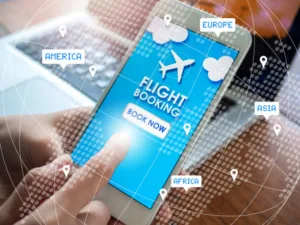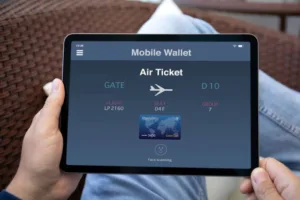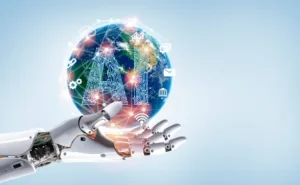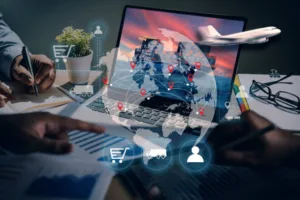AI and ML:

The travel industry is constantly on the move, and B2B travel software is no exception. Now, get ready for an even bigger leap forward with the power of artificial intelligence (AI) and machine learning (ML). These cutting-edge technologies are transforming the way B2B travel software operates, offering a game-changing experience for businesses and their clients.
Imagine this:
1. Effortless Booking: Streamline the booking process with AI-powered recommendations that suggest flights, hotels, and activities tailored to your clients’ needs.
2. Personalised Travel Experiences: Go beyond the ordinary. ML algorithms learn client preferences, creating unique travel packages that exceed expectations.
3. 24/7 Support: Never miss a beat. AI-powered chatbots provide instant customer support, resolving issues and answering questions around the clock.
What is artificial intelligence (AI) and machine learning (ML)?
Here’s a breakdown of AI and ML in layman’s terms:
Artificial Intelligence (AI):
Imagine a super-smart computer programme that can learn and act like a human to some extent. Think of it as a machine that can:
1. Think and reason: analyse information, solve problems, and make decisions based on complex data sets.
2. Learn and adapt: continuously improve its performance by learning from past experiences and data.
3. Mimic human behaviour: recognise patterns, understand language, and even generate creative text formats.
Machine Learning (ML):
Consider ML as a specific technique used within AI. It’s like training a student to become an expert in a particular field. Here’s how it works:
1. Data, Data, Everywhere: ML algorithms are fed massive amounts of data, like past booking information, travel trends, and client preferences.
2. Learning from Examples: The algorithm analyses this data and identifies patterns and relationships between different factors.
3. Making Predictions: Based on the learned patterns, the algorithm can then make predictions about future events or suggest optimal options.
AI vs. ML: A Simple Analogy
Think of AI as a broad field like medicine. ML is a specific tool used within medicine, like a diagnostic tool that analyses patient data to identify potential illnesses.
In the context of B2B travel software:
1. AI empowers the software to understand complex travel data, analyse trends, and even make personalised recommendations.
2. ML allows the software to learn from past booking patterns and predict future travel demands, enabling businesses to offer competitive pricing and optimise their travel programmes.
Remember: AI and ML are powerful tools, but they are still under development. While they offer immense potential, it’s crucial to address challenges like data security, algorithmic bias, and ensuring transparency in their decision-making processes.
Read More: How B2B Travel Software Supports Customer Satisfaction
The Impact of AI and ML in the B2B Travel Industry:

So, how exactly are AI and ML transforming B2B travel software? Let’s dive into the key areas where these technologies are making a significant impact:
1. Smarter Search and Recommendations:
i. AI analyses vast amounts of data, including travel trends, past bookings, and client preferences.
ii. This translates to personalised suggestions for flights, hotels, and activities, saving time and ensuring clients find the perfect travel options.
2. Dynamic Pricing Optimisation:
i. Forget static pricing. ML algorithms take real-time factors like competitor prices, seasonal fluctuations, and demand into account.
ii. This allows businesses to adjust prices strategically, maximising revenue while remaining competitive.
3. Predictive Analytics:
i. AI can predict future travel trends and booking patterns with remarkable accuracy.
ii. Businesses can leverage this knowledge to plan inventory more effectively, anticipate client needs, and make data-driven decisions for long-term success.
The Benefits of AI & ML for Your Travel Business:
1. Increased Efficiency: AI automates repetitive tasks, freeing up your team to focus on what matters most: building relationships and providing exceptional customer service.
2. Improved Customer Satisfaction: Personalised travel experiences and 24/7 support lead to happier clients, fostering loyalty and repeat business.
3. Boosted Revenue: Dynamic pricing strategies and optimised inventory management unlock new revenue opportunities and maximise profitability.
Real-world Impact:
Studies by McKinsey & Company show that businesses that leverage AI see a 20% increase in customer satisfaction and a 15% boost in revenue.
ML and AI in B2B Travel Software: Additional Ways to Put Them to Use

1. Fraud Detection: AI can identify suspicious booking patterns, preventing fraudulent transactions and protecting your business.
2. Content creation: AI can personalise marketing materials and travel recommendations based on client demographics and preferences.
3. Risk Management: ML algorithms can analyse travel disruptions and provide real-time updates, allowing businesses to proactively address potential issues and minimise client inconvenience.
Read More: The Benefits of B2B Order Management Software
ML and AI in B2B Travel Software: Challenges and the Road Ahead
While the potential of AI and ML in B2B travel software is undeniable, implementing and adopting these technologies effectively comes with its own set of challenges:
1. Data Security and Privacy: As AI and ML rely heavily on data analysis, ensuring robust data security measures is crucial. Businesses need to prioritise data encryption, access control, and compliance with relevant privacy regulations to build trust with clients.
2. Integration Complexity: Integrating B2B travel software equipped with AI and ML with existing systems can be complex. Businesses need to invest in robust APIs (application programming interfaces) and technical expertise to ensure seamless data exchange and avoid compatibility issues.
3. Initial Investment Costs: Implementing AI and ML-powered B2B travel software can involve significant upfront costs, including software licences, hardware upgrades, and potentially hiring additional personnel with data science expertise.
4. Change Management: Transitioning to a new software system with advanced AI and ML features might require employee training and support. Overcoming resistance to change and ensuring team members adapt to the new functionalities is crucial for successful adoption.
Overcoming the Hurdles: A Roadmap for Success

Despite the challenges, here’s how businesses can navigate the road to successful implementation and reap the benefits of AI and ML-powered B2B travel software:
1. Conduct a thorough needs assessment. Clearly define your business objectives and identify areas where AI and ML can offer the most significant value.
2. Choose the right software partner. Select a B2B travel software provider with a proven track record in AI and ML development that offers ongoing support and training.
3. Invest in data security: Implement robust security measures to protect client data and ensure compliance with relevant regulations.
4. Prioritise employee training. Provide comprehensive training and support to your team to equip them with the skills and knowledge to effectively utilise the new software features.
5. Embrace a data-driven culture. Encourage a company-wide focus on data analysis and leverage insights from AI and ML to make informed decisions and optimise your travel programmes.
Read More: Real-World B2B Software Implementation: Lessons Learned and Best Practice
The Future of AI and ML in B2B Travel Software:
The future of B2B travel software is intelligent and personalised. As AI and ML continue to evolve, we can expect even more exciting developments, such as:
1. Voice-activated booking: Imagine booking entire business trips with just your voice!
2. Virtual travel assistants: AI-powered assistants will handle everything from booking flights to recommending restaurants and attractions.
3. Hyper-personalisation: Travel experiences will be tailored to individual preferences with an unprecedented level of detail.
Conclusion:
Machine learning and AI are defining the future of business-to-business travel technology. By embracing these transformative technologies, businesses can unlock a world of increased efficiency, reduced costs, enhanced customer satisfaction, and data-driven decision-making. While challenges exist, a well-defined strategy, the right partnerships, and a commitment to continuous learning can pave the way for a successful transition and position your B2B travel business for long-term success in the ever-evolving travel landscape.










